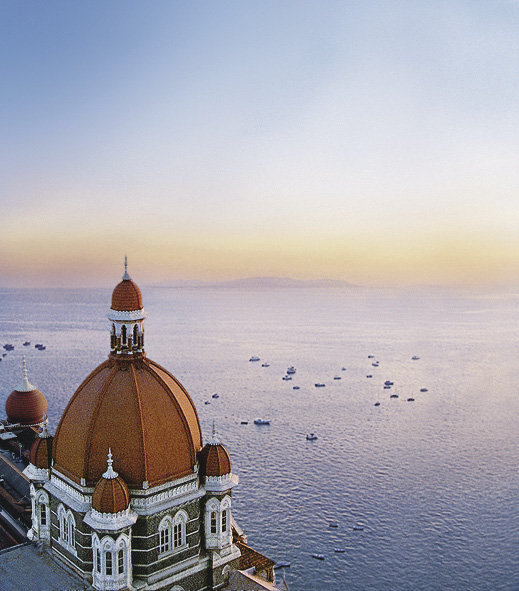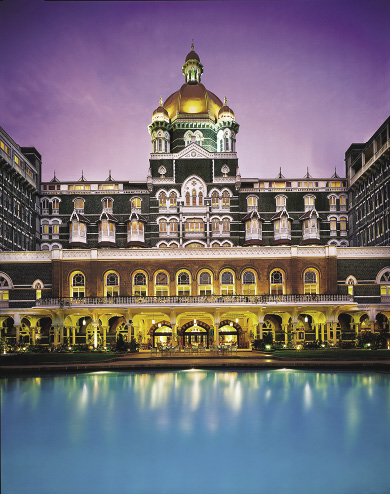


![]()
ONLINE

Taj’s Tradition
Editors’ Note
Raymond Bickson began his career at the Berlin Hilton in 1973. Following worldwide managerial postings, predominantly with Regent International Hotels of Hong Kong and Monaco’s Rafael Group, he joined The Mark in New York in 1988, where he served as Vice President and General Manager until assuming his current post in 2003. Bickson studied in Berlin, Paris, Lausanne (Switzerland), and at Cornell and Harvard Universities.
Company Brief
Mumbai-based Taj Hotels Resorts and Palaces (www.tajhotels.com) is recognized as India’s largest and finest hospitality chain. Founded in 1903 and owned by the Tata Group, it consists of more than 60 properties located throughout the subcontinent, as well as in southern Asia, the Middle East, Africa, New York, Boston, and London. In addition to its luxury hotels in India – several of which are members of The Leading Hotels of the World – the group operates business hotels, palace hotels, beachfront resorts, and garden retreats.
What makes the Taj brand so special and has helped you remain consistent in service and quality?
Taj Group offers its guests a renowned hospitality experience through an articulate collection of brands, each enlivened by an illustrious commitment to serving its guests. With its 100-year heritage and its legendary hospitality, the Taj has become a definitive hospitality icon.
Since its inception, Taj has been associated with the celebration of India’s rich and cultural heritage. The Taj Group celebrates its values of restorative ethics by converting royal palaces and residences into luxurious hotels, universally acclaimed for their distinctive guest experiences. Every Taj hotel has a unique personality, expressed in décor, service, and dining facilities, offering meaningful experiences. What is common to all and the distinguishing mark of the Taj brand is the focus on guest delight. For over a century, we have built our reputation on legendary hotels, unparalleled personalization, and impeccable service. Brand Taj is deeply rooted in history and tradition, and is defined by its unique emotional equity that is authentic and non-replicable.

The iconic dome The Taj Mahal Palace, Mumbai
What is the condition of the travel market in India and will strong growth come from your properties there?
Over the past decade, India has witnessed unparalleled growth despite problems like lack of infrastructure and project delays. The Indian travel, tourism, and hospitality sector is estimated at $36 billion in 2012. India’s travel and tourism sector contributed approximately 6 percent to India’s total gross domestic product (GDP) during 2012. That percentage is expected to cross 8 percent per annum. The burgeoning domestic middle class coupled with a young population has fueled this growth and has become more aspirational. This growth has not only promoted the interest of the domestic market but also triggered an influx of international players looking at India as a critical part of their global expansion strategy.
Domestic demand from Indian travelers is on the rise and contributes to about 50 percent of Taj’s business. We also see more Indians wanting to explore India, and taking both short- and long-haul holidays to many of our luxury hotels. We have also seen traction in the upper-upscale and upscale sectors, which are represented via our Vivanta By Taj and Gateway Brands. We see growth being driven across all of our brands; however, the majority of the growth is fueled by commercial cities across India. Our footprint has grown to 105 hotels within India and 17 in gateway cities of the world. The overall demand in India is growing at 22 percent while supply is growing at 23 percent, which is an indication of the burgeoning hotel industry in India.
What are the key characteristics that make a property uniquely Taj?
Taj represents the finest in Indian hospitality. It has seen India transform and is the symbol of hospitality in India. Taj encompasses a unique set of iconic properties rooted in history and tradition that deliver truly unforgettable experiences. Staying at a Taj hotel gives guests a true sense of place, history, and authenticity in a refreshingly modern manner. Taj reinterprets Indian hospitality for current times. The Taj Group has consistently provided high levels of personalized service and innovative means of improving service quality.
The Taj Group has defined a well thought out business development strategy that dictates service philosophy and product definition, across each brand. The Taj Group also prides itself in the symbiotic relationship it shares with its target communities. The vision of its founder, Jamshedji Tata, is ‘purpose of business,’ and that is rooted in the advancement of society in which the business operates.

The pool of The Taj Mahal Palace, Mumbai
What defines a true luxury travel experience today?
Luxury is in the eyes of the beholder: for some, it translates into space and bigger room sizes; for others, it may just be a vacation without their smart phones or TVs. There are people who value both kinds of experiences.
A true luxury travel experience today is a stay that is personalized to perfection. At our Grand Palaces, guests experience elaborate ceremonial welcomes, exclusive and unique dining options, and ritualistic spa treatments. We want the experience to be a discovery of something enchanting and memorable and also to give our guests a sense of place.
You have stated that true values and heritage are key drivers for a successful business strategy in luxury hospitality. Would you expand on that?
Most luxury brands have tradition, heritage, and authenticity in common, which drives their preciousness and values, thus enhancing competitive advantage and consumer preference.
While Taj is a symbol of luxury hospitality, it has a unique portfolio of iconic hotels that are deeply rooted in history, tradition, and culture. This delivers a truly unforgettable experience to guests building narratives and memories for them to ensure repeat purchase and loyalty. Our heritage and cultural equity, built over a century and offered distinctively, gives us a business advantage and a value proposition that cannot be replicated easily. This then becomes a key driver for growth and market share.
What are some key travel trends that you foresee?
We anticipate the blurring of lines dividing the traditional definitions of “business” and “leisure” travel. Hotels would need to address needs of a business traveler while simultaneously providing for adequate opportunities for R&R. All of this will result in increasing need for personalization leading to tailored offerings in terms of product, services, and experiences. High-end travelers are looking for luxury on a smaller scale now. It’s not good for a hotel to be too big. The highest level of the luxury market will even prefer a hotel small enough to be taken over by one or two families. Technology will play a key role in enabling hotel companies to deliver best products and services to its guests.•